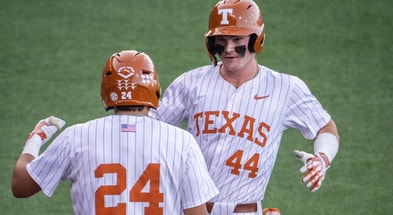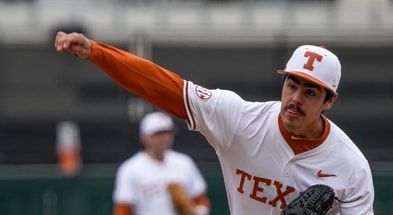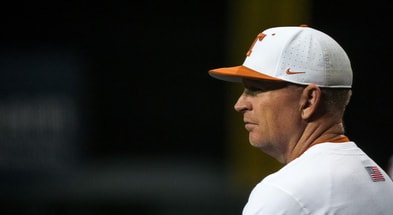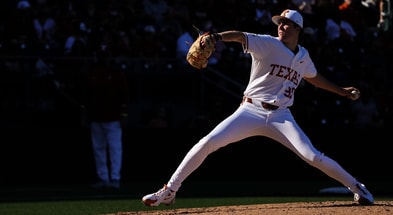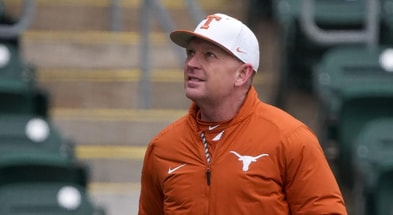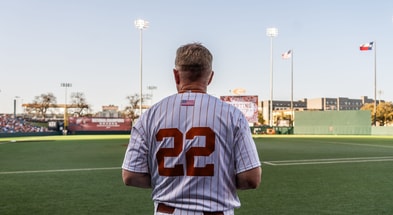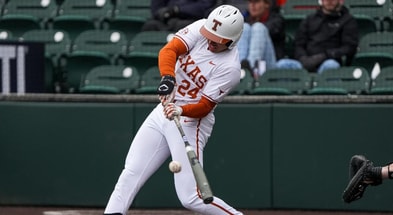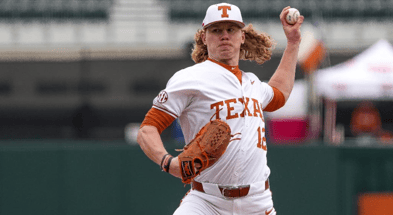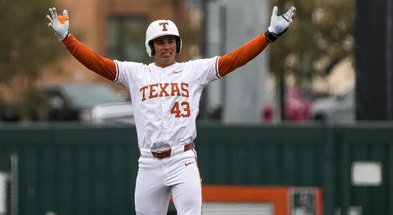AUGIE: Influence of legendary coach still felt one year after passing

Former Texas head coach and college baseball icon Augie Garrido passed away one year ago. Coaching colleagues, players, and administrators still use lessons learned from a man they considered a friend, August Edmun Garrido, Jr.
It’s hard to be the guy after the guy. It’s also difficult to be the guy at the program.
When you succeed enough to be the guy or to be at the program, you’re going to be, at a minimum, remembered. Those that don’t succeed simply become words in dusty media guides. Those who do succeed become immortalized.
Put another way, the world treats winners a lot different than it treats losers.
That was one of the many lessons offered by former Texas head baseball coach Augie Garrido, who passed away one year ago at the age of 79.
Garrido was a winner. He won five national titles in four different decades, two of them at Texas. He won 1,975 games, more than anyone in college baseball history until Florida State’s Mike Martin passed his mark last year.
Garrido’s wins are no small accomplishment, but the relationships he developed throughout his career as a teacher, coach, and friend are just as important to those who were a part of Garrido’s many successes as the championships and accolades.
To commemorate the one year anniversary of Garrido’s death, Inside Texas spoke with former players, coaching colleagues, and administrators impacted by Garrido over the course of his illustrious career, including:
–David Pierce, Texas baseball head coach
–Shaka Smart, Texas men’s basketball head coach
–DeLoss Dodds, Texas athletic director (1981-2013) and current special assistant to the president
–Drew Bishop, Texas pitcher (2005-2008) and current Texas assistant athletic director for baseball operations
–Parker Joe Robinson, Texas pitcher (2015-2018)
–James Barton, Texas catcher (2013-2016)
Teacher
While pitching at JSerra High School just south of Los Angeles, Parker Joe Robinson had a decision to make. He was good enough to play baseball at the college level and had several schools after his services.
As happens often during the recruiting process, Robinson sat and talked with his family many times about the decision in front of him. Robinson was open to leaving California and going on his own path.
Texas was one of the schools Robinson was open to attending, but there was a problem with Texas as it related to forging his own path. Robinson’s father Jeff played for Garrido at Cal State Fullerton from 1980 to 1983, so there already was a familiarity with Garrido within the family.
Robinson wasn’t totally sold on the prospect of playing for the same coach his dad played for. He had seen the Longhorn Network and huge crowds at Disch-Falk Field compared to some of the stadiums at West Coast schools, but that one sticking point at head coach gave him pause.
“I had to get convinced a little bit from my parents because I wanted to be my own trailblazer,” Robinson said Monday. “I know Augie’s the best coach and everything, but maybe I want to go and do my own thing. Maybe not play for who my dad played.”
His high school career progressed, with his dad as pitching coach, and the time for a decision was getting closer and closer. Jeff and Parker Joe spent a lot of time together traveling from place to place, field to field. Those long car rides led “P-Joe,” who is currently in spring training with the Los Angeles Angels, to a realization about the opportunity in front of him.
“The more and more that the offer was sitting on the table, the more and more it seemed like there’s no way I cannot go to the University of Texas and play for coach Garrido,” Robinson said.
The mantras Jeff learned in the early 1980s weren’t too far from the ones Parker Joe learned in the mid 2010s; pitch-by-pitch and inning-by-inning (the basis for the title of the 2008 documentary about Garrido).
Inning-by-inning was a huge part of Garrido’s philosophy: Don’t worry about the past, it’s behind you. Don’t worry about the future, it will distract you from the present.
Though in the sports world now, Robinson was in the business world at Merrill Lynch in the offseason. Lessons learned from Garrido helped him through those days where he had to show up at the office at 6:30 a.m.
“If you just narrowed it down to one task at a time, one task at a time, the next thing you know your day goes through,” Robinson said. “You get everything done. You’re successful. You feel like you’re totally accomplished at the end of the day.”
Those lessons apply to working for the Angels, too.
“Even now that I’m in spring training, you get to the field and you’re throwing a bullpen. You’ve got to work one pitch at a time, or one rep in the weight room at a time,” Robinson said. “That just echoes in all aspects of life.”
Robinson redshirted in 2015 and made three appearances in 2016, Garrido’s final year in coaching. Throughout those two years, Garrido offered Robinson “so many” moments and “countless lessons” to remember. Some of those lessons weren’t easy to accept, especially for a pitcher. The message was heard loud and clear because it was delivered loud and clear.
“He just walks up to your locker and puts it in plain terms,” Robinson said. “He’s just like ‘you need to get better. It’s for the team.’”
“There’s not any specific moment, but all of those put together. He just put it on the line. He trusted you. He trusted all of his players. If he was going to tell you you need to get better, you knew in your own heart you really did need to get better. You need to put in more work. You need to be the first one there, last one to leave.”
Those lessons were taught in order to create winners. Multiple generations of Robinsons understood it and won as a result.
“At the end, if you come out the winner, people are going to remember you as the winner,” Robinson said. “That’s always been something that’s echoed throughout my life.”
#############################
In order for the public to be able to honor Garrido after his death, a celebration of life was held at the Erwin Center on April 9, 2018.
On the program distributed to attendees, two lines that embodied Garrido were in burnt orange across the top of the small piece of paper.
“Our job is to help the players themselves fulfill their destiny. Period.”
Garrido did this with his own work, but also influenced others in coaching with his method of teaching including co-workers in the UT athletic department.
Shaka Smart was one of those coaches. Smart’s first season coincided with Garrido’s last at Texas, but in their time the two developed a close friendship. Smart spoke at the celebration of life about Garrido, recalling stories of late night dinners and conversations shared between the two.
Smart and Garrido coached very different sports, but Smart learned from Garrido the impact coaching can have on young people and on a team.
“As it relates to coaching, he taught me that you can’t be your best as a team if anyone on the team has an intention other than the team being successful,” Smart said March 8. “He taught me that you have to have a mentality of going after something more so than you have to have a mentality of keeping something from happening.”
“He taught me about love. For a grown man and someone that’s won almost 2,000 games and all the success, all the statistical, positive results he’s created, he always said it comes down to love. Loving your players and creating, most importantly, a love from player to player on your team. That’s when you’re able to go do something special.”
Garrido kept that mentality across his lengthy coaching career and was able to relate it to almost everyone who entered one of his programs, including to the man who succeeded him.
David Pierce took over the Texas baseball program after Garrido stepped down in the spring of 2016.
Rather than hold any animosity against Pierce, Garrido became a valuable asset to the program. He appeared several times in support of the program in Pierce’s first season, and was never a distraction for the man who took the program’s reins.
Augie meant so much to baseball, The University of Texas, and to me personally. He was a tremendous coach and supporter, but I valued our friendship more than anything.
Before our uniform patches arrive, join us in wearing black sweatbands in remembrance of Coach this weekend. pic.twitter.com/QlzCTAC18K
— David Pierce (@DP5hookem) March 16, 2018
Pierce has been a college head coach since 2012. He’s had to recruit and motivate kids at Sam Houston State, Tulane, and Texas. Prior to that, he worked with the Houston Cougars and Rice Owls as an assistant.
Garrido’s successes were notable in how he was able to coach across generations. He reached the College World Series in five different decades. He built an upstart program at Cal State Fullerton, led Illinois to some of its best seasons, and created a superpower at Texas. He had to appeal to a variety of players and succeeded more than he failed.
“He was very adaptable to different generations,” David Pierce said Thursday. “I think that’s what made him so special.”
None of it was fake. What you saw was what you got from Garrido. That translated across sports.
“He was really, really authentic and that’s rare in today’s day and age,” Smart said.
Coach
When searching for the replacement for former Texas head coach Cliff Gustafson, DeLoss Dodds had just one name in mind.
“We went after him and no one else,” Dodds said Monday of Garrido. “We had known him because he was a friend of coach Gustafson, been here for ballgames, we’d see him in Omaha. I was very impressed with him after they played in the World Series up there and his press conference afterwards. We just knew he was who we wanted.”
His career up to that point had spoken for itself. Three national titles at Fullerton had gotten much of the nation’s attention, including Dodds’.
“And Illinois,” Dodds made sure to add when discussing Garrido’s stops prior to Texas. Garrido was the best there was in college baseball, so Dodds made sure to go and get him.
Forty-nine (and a half) years of Texas Baseball history. 🤘 pic.twitter.com/DQCDHvDO0d
— Texas Baseball (@TexasBaseball) February 4, 2017
Today, there’s a statue outside of Disch-Falk Field of the baseball coach Dodds brought to Texas over two decades ago, but it’s not something he credits himself for. To him, it was the obvious choice.
“I don’t take credit for being smart when I hired him,” Dodds said. “I just take credit for knowing he was the guy for the job. I think anybody could have seen that.”
In his interview with Inside Texas, Dodds spoke not only about Garrido’s presence on the field, but off it. He praised Garrido’s wife Jeannie and spoke about how Augie “had a little California in him.”
“But it worked,” he would add.
Members of Dodds’ family even connected with Garrido. His grandson, Steffan Schmieding, was a member of the UT golf team from 2007 to 2012. At some point in his career, Schmieding was struggling with the level of competitiveness needed to survive in college athletics.
Schmieding approached Dodds and, thinking he was about to provide grandfatherly wisdom, Dodds prepared for the request for help.
“He said, do you care if I go talk to coach Garrido about it?” Dodds said. “I said go for it. He had the reputation of just being good with people, knowing how to fix things in personal lives and on the field, and he was very unique.”
Others went to Garrido for help with competition because he excelled in the midst of it. He and his teams always seemed ready to play, even on the biggest stage of his sport. During Dodds’ first trip to Omaha with a Garrido-coached team, he sat in the Rosenblatt Stadium dugout with Garrido prior to a game, showing signs of nervousness. He thought Garrido would be too, but the worry was not shared.
“You know DeLoss? This is home to me,” Garrido told Dodds.
“That’s the maturity and confidence, and that rubs off on people that are around him,” Dodds said.
#############################
Garrido was 58 going into his first season as head coach of Texas. When he was recruiting Drew Bishop to play at Texas, he was in his mid-60s.
Top 10
- 1New
Kirby Smart
Calls out tampering
- 2
Morez Johnson
Illinois forward transfers to Michigan
- 3
Buzz Williams
Maryland hires Texas A&M head coach
- 4
Tre Donaldson
Michigan guard enters portal
- 5Hot
Pat McAfee
Ole Miss student to sue ESPN
Get the On3 Top 10 to your inbox every morning
By clicking "Subscribe to Newsletter", I agree to On3's Privacy Notice, Terms, and use of my personal information described therein.
“A lot of schools that recruited me tried to play the card that he wasn’t going to be here, he was almost done, he was never around, and all that kind of stuff which was funny,” Bishop said Tuesday. “From that time, he was here another 13 years after they were saying that.”
Bishop was a member of the 2005 national championship team and joined the athletic department as director of baseball operations prior to the 2009 season.
He was able to see the best of Garrido’s coaching ability that instilled confidence in his players during that run to Omaha in his freshman year.
The expectations at Texas for baseball are some of the highest in the nation, and Garrido coached like it. Bishop said Garrido would hammer home his pitch-by-pitch, inning-by-inning mantra early in the season to make sure the team understood it. “He was hard on us early on,” Bishop said.
That was for a reason. Garrido stressed his beliefs constantly early in the year so it would become second nature later on. As the stakes became higher and higher as the season progressed, Texas seemed to flourish where so many other teams failed. Rather than fold under pressure, they embraced their coach’s confidence until they embodied it.
“The work was done once we got to the postseason,” Bishop said. “It was go out, be yourself, make plays. We did what we were trained to do where other teams were trying to do too much.”
Coach, we are all privileged to have played for, worked for, and known you as a friend. You lived more in 79 years than most could in 150. We are all better because of you. #RIPAG16
— Drew Bishop (@drewhbishop) March 15, 2018
So when Texas beat four-seed Baylor, top-seeded Tulane, Baylor again, and seven-seed Florida to win the 2005 national championship, Bishop became a member of a team known for being winners.
Winners, you’ll recall, receive special treatment.
Bishop won several program awards and conference academic honors while a student-athlete. He transitioned from a playing career to a successful athletic administrative career, and does a lot of work behind the scenes to help Texas baseball. The part of his past that includes being a champion is what comes to mind first for many.
“The world treats winners different than it does losers,” Bishop said. “I know all of the guys that have played here and played for him and won anything of substance will bang that drum. It’s true.”
“Anybody that asked me when I played here, I say 05-08, the first thing out of their mouth is ‘oh, so you won a national championship.’ Whether we like it or not, people associate you with that.”
Bishop’s work with Garrido as a member of his staff revealed a similar philosophy with his staff as his players. Garrido would make sure his staff members were able to succeed under pressure. Once they did, he knew he could watch them work.
“He let us do our thing,” Bishop said. “It helped us develop as a player and as a person. He didn’t get into all the details and micromanage. He let people do their job until they gave him a reason not to do it.”
In both of his roles at Texas under Garrido, Bishop could feel by his head coach’s actions that he meant every word of support and concern ever offered.
“When you live that and practice it, it goes a long way,” Bishop said. “Maybe what you’re telling them to do could be outdated, but if they know you care about them and you tell them to do something, they’re going to find a way to do it.”
Friend
Garrido managed players from several generations, but as the head coach of an athletic team, he had to manage players of various skill levels in addition to their personalities. There were stars, guys like Huston Street, Taylor Jungmann, and J. Brent Cox. There were others who contributed but weren’t stars.
Then, there were bullpen catchers.
Garrido valued players who worked hard despite not seeing a lot of playing time and who were a positive clubhouse influence. They were akin to walk-ons on a football team. They may not get the glory, but they do just as much dirty work as those who do.
James Barton held this role over the final seasons of his collegiate career. He ended up at Texas because the Longhorns lost two catchers in his class to the MLB Draft. Over offers from Lamar and Dallas Baptist, Barton joined the Longhorns baseball team and planned to study business.
He knew as a walk-on playing time wasn’t guaranteed. In fact, it was non-existent for Barton.
“He brought me in after my sophomore year and was like hey, you’re not going to see playing time,” Barton said Monday. “You can either transfer anywhere you want to go, or you can stay on as full-time bullpen catcher and be my eyes and ears.”
“That was easily the best choice I ever made and I got to know him really well through that.”
Barton joined Grant Martin, Hunter Wilcox, and Patrick Marsh in the line of bullpen catchers at Texas.
The last text I got from Augie. Sums up his love for his players. We will miss him dearly #Augie pic.twitter.com/B2qQa8p0Qg
— James Barton (@jamesbarton10) March 15, 2018
Carrying a bullpen catcher, not only on the 35-man roster but also on the 27-man conference travel roster, showed how much Garrido valued someone like Barton.
As a bullpen catcher, Barton never expected to play. He would pick up a bat during practice and joke with Garrido about receiving playing time. He’d tell Garrido, “I’m ready whenever you’re ready to put me in.”
That, however, wasn’t his role. Barton grew from being the bullpen catcher to essentially being the bullpen coach. Garrido relied on Barton, and Barton sat by Garrido every day at practice.
During Barton’s senior season in 2016, Texas was in a midweek game against Prairie View A&M. Texas entered the bottom of the eighth inning with a 2-0 lead, but put together a five-run rally to seal the game late.
In the eighth, Barton was in the bullpen when the phone rang. It was Garrido.
“He actually called down to the bullpen himself, which he never did,” Barton said.
Garrido told him he was on deck. He sprinted to the dugout, grabbed his cleats, put on a helmet, and moved to the on-deck circle. All with his fly undone. “That was kind of a funny side note because it all happened so quickly,” Barton said.
Barton ended up grounding out in his only career at bat, but he was grateful to Garrido for giving him the opportunity.
“The cool part of that is that he knew how much that meant to us,” Barton said. “He appreciated a lot of the work that we had done out in the bullpen. Getting that at bat was just icing on the cake.”
Barton, now working for JP Morgan, said he uses Garrido’s competitive, inning-by-inning approach in his daily life. He understands that was an important lesson, but one lesson stood apart from the rest.
“Above everything else, Augie understood what it meant to represent something bigger than himself,” Barton said. “I draw parallels to that all the time between UT baseball and JP Morgan. It was all about the University of Texas and all about ‘us,’ ‘we,’ and the collective team.
“I think that was part of his lasting legacy, just teaching 18 to 22 year old young men coming to UT all about themselves. How to put that aside and put that into the ‘we’ part of it.”
#############################
Garrido was a California native, but spent much of his time following the 2016 season in Austin. He remained supportive of the program and constantly offered help to Pierce in his first season.
He didn’t change his ways, either. Even after he no longer put on his signature No. 16 for games, he remained close with his former players. He even took in some of the action when Texas traveled to Long Beach in 2017 for an NCAA Regional.
He showed up to alumni functions, and made sure to keep all the relationships he built over the years. He could have gone low and lashed out at those who might have doubted him or who he felt responsible for his exit. He never did.
“He was very astute in the sense that everything he had was a result of the University of Texas,” Bishop said. “He was like ‘I’m not going to ruin all the relationships I have.’ Would he have rather kept coaching? Sure, but he handled it with a lot of class and treated people with respect. He really did an incredible job of having everybody on his side.”
To sum it up, “Everyone still loves Augie,” Bishop said.
“He loved his guys,” Barton said. “I think that was probably consistent across all 50 years.”
“I miss him a lot,” Smart said.
“He was a dear friend, and I miss him every day,” Dodds said.





